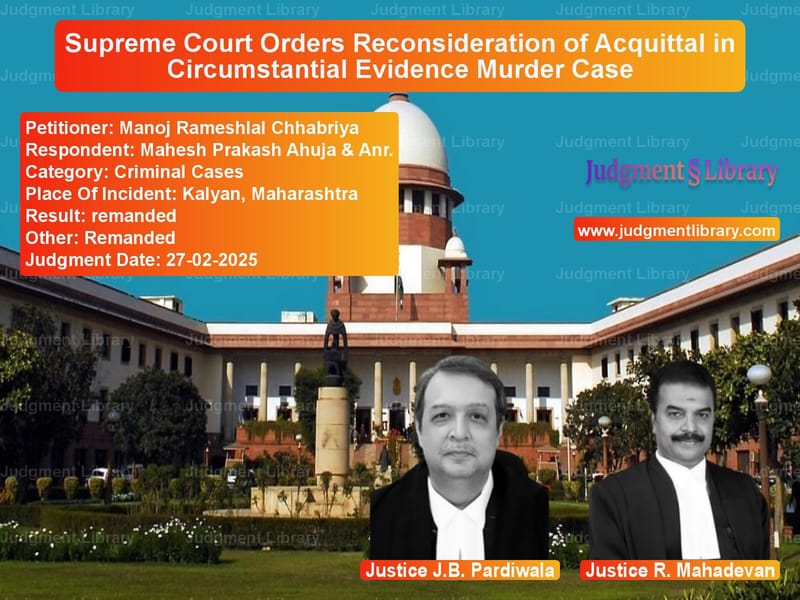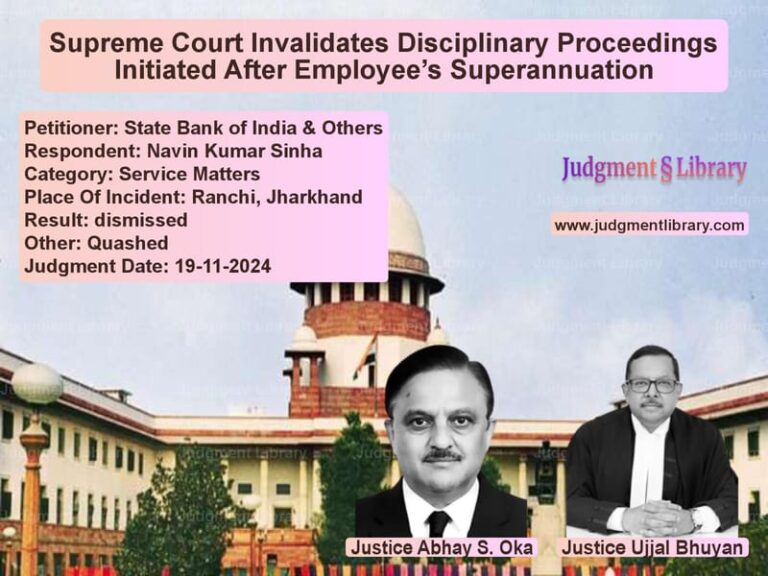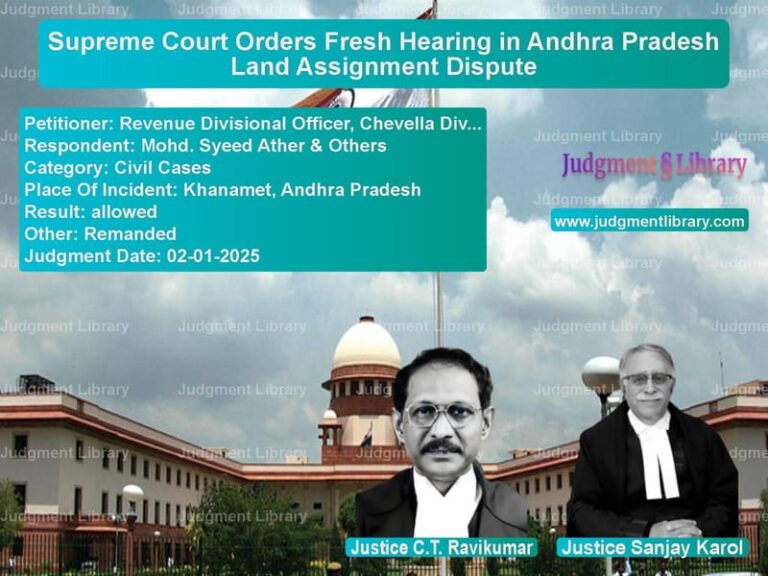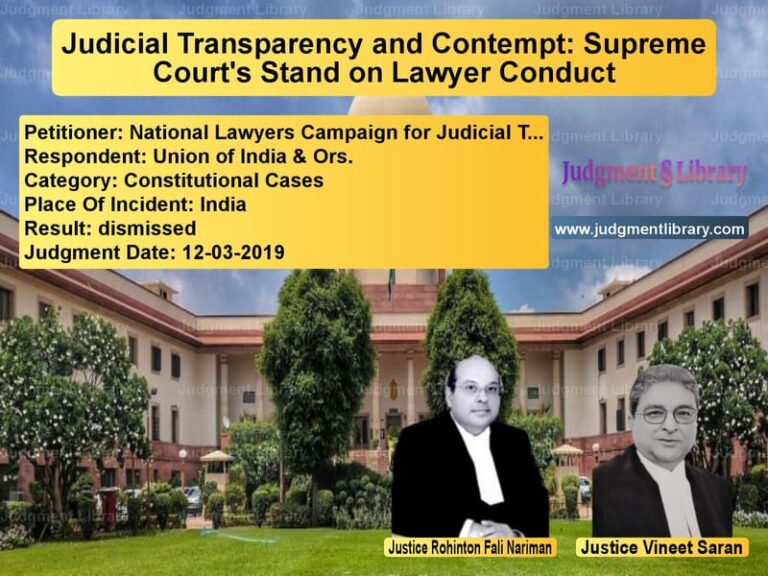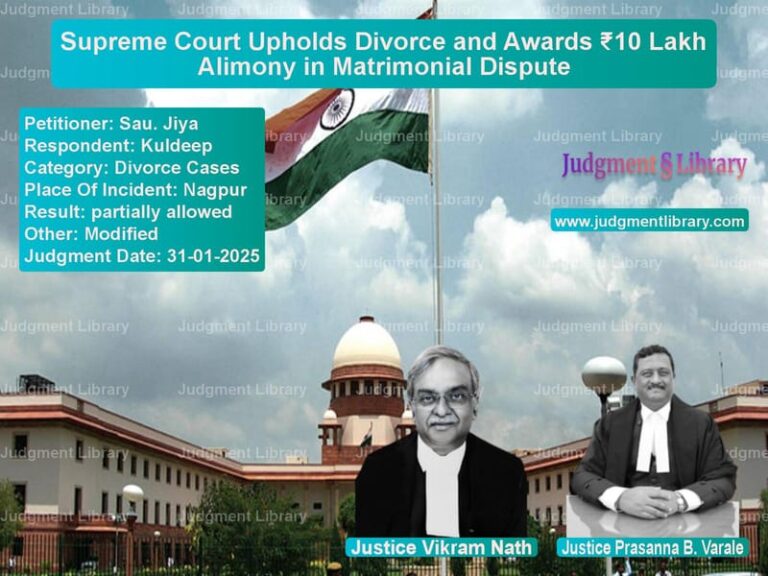Supreme Court Orders Reconsideration of Acquittal in Circumstantial Evidence Murder Case
The Supreme Court of India, in the case of Manoj Rameshlal Chhabriya v. Mahesh Prakash Ahuja & Anr., has directed the Bombay High Court to reconsider the State’s appeal against the acquittal of the respondent in a murder case based on circumstantial evidence. The Court ruled that the High Court erred in refusing to grant leave to appeal and emphasized the importance of judicial scrutiny in cases of circumstantial evidence.
Background of the Case
The case pertains to the alleged murder of Reena Ahuja, wife of respondent Mahesh Prakash Ahuja, on the night of April 2, 2011. The prosecution alleged that the respondent killed his wife by shooting her with his licensed pistol after celebrating India’s victory in the 2011 Cricket World Cup Final. Their 15-year-old son, Umesh, was purportedly the sole eyewitness.
The trial court acquitted the accused, citing lack of direct evidence, unreliable witness testimony, and deficiencies in forensic examination. The State of Maharashtra filed an appeal against the acquittal before the Bombay High Court, but the High Court declined to grant leave under Section 378(3) of the Code of Criminal Procedure (CrPC), thereby preventing the appeal from being heard.
Legal Issues Considered
- Whether the High Court erred in refusing leave to appeal in an acquittal case based on circumstantial evidence.
- Whether the trial court correctly evaluated the evidence, particularly the credibility of the eyewitness and forensic findings.
- The role of appellate courts in ensuring justice when circumstantial evidence forms the basis of a conviction or acquittal.
Petitioner’s Arguments (Brother of the Deceased)
The petitioner, Manoj Rameshlal Chhabriya, brother of the deceased, challenged the High Court’s refusal to grant leave to appeal, arguing:
- The case was based on strong circumstantial evidence, and the trial court ignored key forensic findings.
- The eyewitness testimony of Umesh, though partially retracted, provided crucial insights into the events of the night.
- The accused’s shirt and hands had blood stains matching the deceased, yet the trial court disregarded this forensic evidence.
- The accused absconded for three days after the incident, which was an incriminating factor ignored by the trial court.
- The trial court wrongly disregarded forensic reports confirming that bullets fired from the accused’s pistol matched the one found in the deceased’s body.
Respondent’s Arguments (Accused – Mahesh Prakash Ahuja)
The defense countered the petitioner’s claims, arguing:
- The prosecution failed to establish a complete chain of evidence necessary for conviction in circumstantial evidence cases.
- The eyewitness testimony was inconsistent and unreliable, as Umesh was declared hostile during cross-examination.
- The delay in filing the FIR raised doubts about its authenticity and whether the case was fabricated.
- The forensic evidence presented by the prosecution was circumstantial and inconclusive.
- The trial court’s verdict was legally sound and should not be interfered with.
Supreme Court’s Observations and Judgment
The Supreme Court, after reviewing the case, concluded that the High Court erred in refusing leave to appeal and that the case warranted a detailed re-examination.
Key Observations by the Court:
- “At the stage of considering leave under Section 378(3) of CrPC, the High Court should look into the prima facie case, not conduct a detailed evaluation.”
- “The trial court’s judgment overlooked crucial circumstantial evidence, including forensic reports and the accused’s behavior post-incident.”
- “In a case based on circumstantial evidence, the prosecution must establish a complete and unbroken chain leading to the guilt of the accused.”
- “The High Court should have at least admitted the appeal for detailed consideration instead of dismissing it outright.”
- “While acquittals are generally not interfered with lightly, cases involving possible miscarriage of justice demand re-evaluation.”
Final Judgment
The Supreme Court ruled:
- The High Court’s refusal to grant leave to appeal was incorrect.
- The matter was remitted to the Bombay High Court for reconsideration.
- The High Court must now hear the appeal on merits and decide whether the acquittal should be upheld or overturned.
- The accused was allowed to continue on bail during the proceedings.
Impact of the Judgment
This ruling has significant implications for criminal jurisprudence:
- Enhancing Appellate Scrutiny: The decision ensures that High Courts do not summarily reject appeals against acquittals without due consideration.
- Reaffirming the Role of Circumstantial Evidence: The judgment underscores that circumstantial evidence, if strong, can be sufficient for conviction.
- Preventing Miscarriage of Justice: By allowing re-examination, the Supreme Court ensures that procedural errors do not lead to wrongful acquittals.
- Guidance on Section 378(3) of CrPC: The ruling clarifies how High Courts should approach leave to appeal in criminal acquittal cases.
Conclusion
The Supreme Court’s judgment in Manoj Rameshlal Chhabriya v. Mahesh Prakash Ahuja & Anr. reinforces the principle that appellate courts must thoroughly examine criminal appeals before dismissing them outright. By directing the Bombay High Court to reconsider the case, the ruling ensures that justice is served, whether through upholding or overturning the acquittal.
Petitioner Name: Manoj Rameshlal Chhabriya.Respondent Name: Mahesh Prakash Ahuja & Anr..Judgment By: Justice J.B. Pardiwala, Justice R. Mahadevan.Place Of Incident: Kalyan, Maharashtra.Judgment Date: 27-02-2025.
Don’t miss out on the full details! Download the complete judgment in PDF format below and gain valuable insights instantly!
Download Judgment: manoj-rameshlal-chha-vs-mahesh-prakash-ahuja-supreme-court-of-india-judgment-dated-27-02-2025.pdf
Directly Download Judgment: Directly download this Judgment
See all petitions in Murder Cases
See all petitions in Bail and Anticipatory Bail
See all petitions in Judgment by J.B. Pardiwala
See all petitions in Judgment by R. Mahadevan
See all petitions in Remanded
See all petitions in Remanded
See all petitions in supreme court of India judgments February 2025
See all petitions in 2025 judgments
See all posts in Criminal Cases Category
See all allowed petitions in Criminal Cases Category
See all Dismissed petitions in Criminal Cases Category
See all partially allowed petitions in Criminal Cases Category

